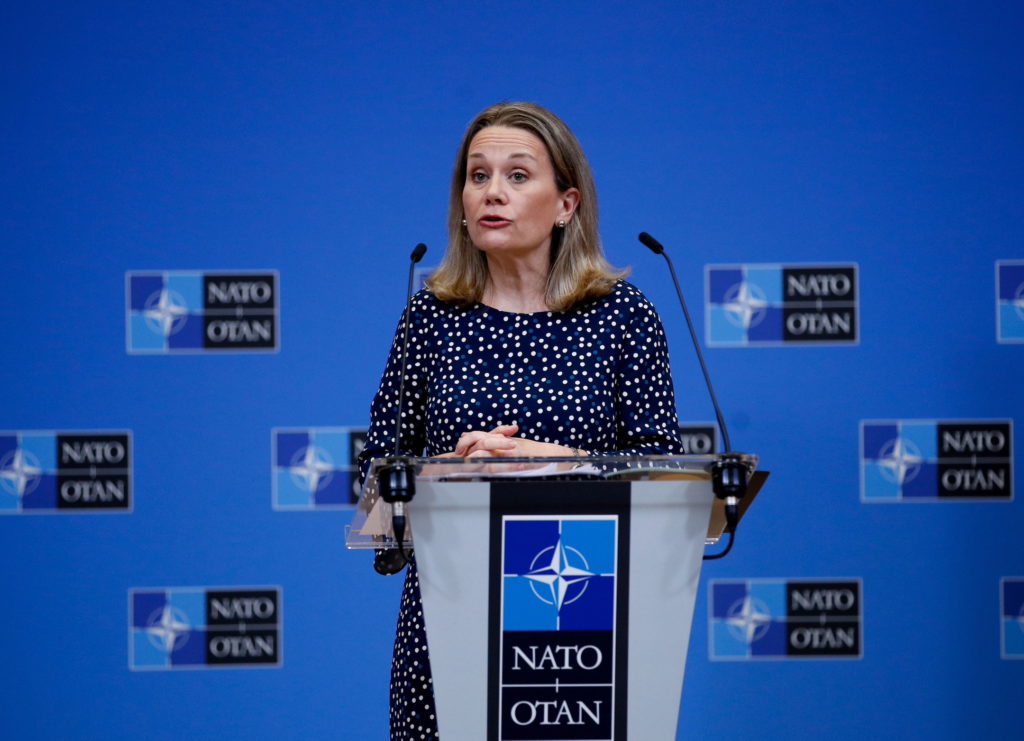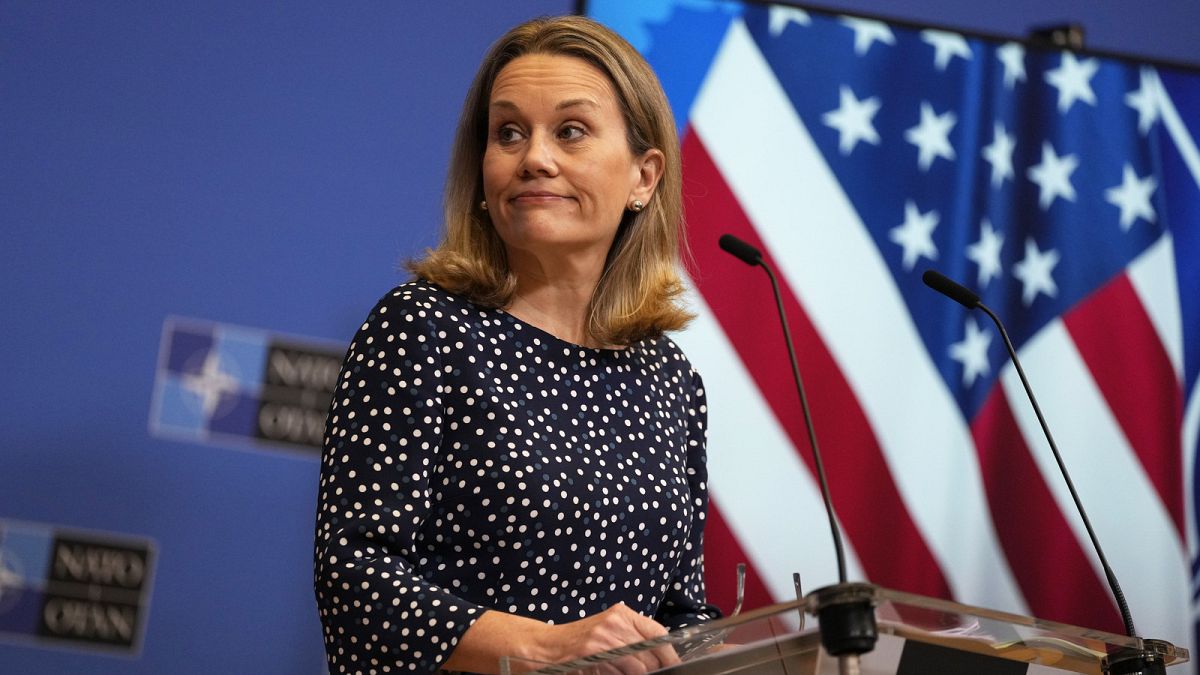Recommendation Tips About Who Is USA NATO Ambassador

Celebrating 75 Years Of NATO United States Department State
The Diplomat at the Door
1. What Does the USA NATO Ambassador Really Do?
So, you're curious about the USA NATO ambassador, huh? Well, pull up a chair and let's dive in. The USA NATO ambassador isn't just some fancy title; it's a crucial role in representing the United States at the North Atlantic Treaty Organization (NATO). Think of them as the U.S.'s lead negotiator and spokesperson in this vital international alliance.
Their job is multifaceted. Firstly, they represent the interests of the U.S. government in all NATO affairs. This includes everything from participating in high-level political discussions and strategic planning to contributing to the alliance's military and defense policies. They work closely with other NATO ambassadors from member countries to find common ground and forge consensus on critical issues.
Secondly, the ambassador acts as a key link between the U.S. government and NATO headquarters in Brussels, Belgium. They ensure a steady flow of information and facilitate communication between Washington and the alliance. They also coordinate the U.S. mission to NATO, overseeing a team of diplomats, military officers, and other experts who work to advance U.S. objectives within the organization.
Imagine them as the person in charge of making sure the US has a strong voice at the NATO table. Its not always easy; they have to navigate differing opinions from various countries with unique priorities. The goal is always to keep the alliance united and effective.

Who Currently Holds the Position?
2. Meet the Current USA NATO Ambassador
As of late 2024, the U.S. Ambassador to NATO is Julianne Smith. She's not new to this diplomatic game. Smith is a seasoned foreign policy expert with extensive experience in national security and transatlantic relations. She previously served in various roles in the Obama and Biden administrations, including as a Special Assistant to the President and Senior Director for European Affairs at the National Security Council.
She's been involved in foreign policy for, what feels like, forever. She brings a wealth of experience to the role. Her past experience on the National Security Council is invaluable, giving her an in-depth understanding of the complexities of foreign policy and the intricate relationships between nations.
Smith's confirmation as ambassador was met with bipartisan support, reflecting her reputation as a skilled diplomat and consensus builder. She is known for her pragmatic approach and ability to work effectively with counterparts from different political backgrounds. Her communication style is direct yet diplomatic, enabling her to articulate U.S. interests clearly while fostering positive relationships with other NATO members. Think of her as someone who is good at getting everyone to agree to go out for pizza, even when half the group wants Thai food.
Her primary focus is strengthening the transatlantic alliance, addressing emerging security challenges, and promoting burden-sharing among NATO members. You can bet shes very busy these days, given the current global landscape.

The Path to Becoming an Ambassador
3. How Does Someone Become a USA NATO Ambassador?
So, you want to be an ambassador? It's not as simple as filling out an online application. The road to becoming a USA NATO ambassador is typically a long and demanding one, requiring a combination of education, experience, and political acumen. Most candidates have advanced degrees in international relations, political science, law, or a related field.
A significant amount of experience in foreign policy, national security, or diplomacy is essential. This could include working for the State Department, the Department of Defense, the National Security Council, or serving in other government positions related to international affairs. Some candidates may also have experience in the private sector or academia, but a strong track record of public service is generally considered crucial.
The selection process is highly competitive. Candidates are typically nominated by the President and then must be confirmed by the Senate. The Senate Foreign Relations Committee holds hearings to evaluate the nominee's qualifications and background before a vote is taken. The process isn't for the faint of heart. It involves intense scrutiny of their records, public statements, and personal life.
Beyond qualifications and experience, it's vital that the President trusts the candidate implicitly. Political connections and fundraising abilities can also play a role, though these are less important than competence and integrity. Ultimately, the goal is to find someone who can effectively represent the U.S. and navigate the complex dynamics of international relations.

Former Ambassador On What Was And Wasn’t At NATO Summit
Why Is This Role Important?
4. The Significance of the USA NATO Ambassador Position
In a world where international cooperation is paramount, the role of the USA NATO ambassador is undeniably critical. NATO, as a cornerstone of transatlantic security, plays a vital role in maintaining stability and deterring aggression. The U.S. ambassador to NATO is at the forefront of this effort, representing American interests and working with allies to address shared challenges.
The ambassador's responsibilities extend to crucial areas such as counterterrorism, cybersecurity, and defense modernization. They help shape NATO policies and initiatives in these domains, ensuring that the alliance remains relevant and capable in a rapidly evolving security environment. The ambassador must stay informed about the latest geopolitical developments, anticipate emerging threats, and work with allies to develop effective responses.
Moreover, the ambassador plays a crucial role in strengthening the bonds between the U.S. and its NATO allies. By fostering trust, promoting dialogue, and finding common ground, the ambassador helps to maintain the unity and cohesion of the alliance. This is especially important at times when there are disagreements or tensions among member states.
The USA NATO ambassador is more than just a representative; they are a bridge between nations, a guardian of security, and an advocate for American values on the world stage. The importance of this role cannot be overstated, especially in a world that often feels uncertain.

Staying Informed
5. How Can You Stay Up-to-Date on NATO and the Ambassador's Activities?
Interested in staying informed about NATO and the activities of the U.S. ambassador? There are plenty of resources available. The official NATO website (www.nato.int) is an excellent starting point. It provides comprehensive information about the alliance's structure, policies, and operations, as well as news updates and press releases.
The U.S. Mission to NATO also has its own website, which offers insights into the ambassador's activities and the U.S.'s engagement with NATO. You can also follow the U.S. ambassador's social media accounts (if they have them) for real-time updates and announcements. Many reputable news organizations provide in-depth coverage of NATO-related issues. Look for sources with a proven track record of accurate and unbiased reporting.
Another way to stay informed is to follow think tanks and research institutions that specialize in international security and transatlantic relations. These organizations often publish reports, articles, and commentaries on NATO-related topics. Some examples include the Atlantic Council, the Center for Strategic and International Studies (CSIS), and the German Marshall Fund of the United States.
Staying informed doesn't have to be a chore. By utilizing these resources, you can gain a deeper understanding of NATO's role in the world and the vital work of the U.S. ambassador. Consider it part of being a well-informed global citizen! And maybe you can impress your friends at the next trivia night.

FAQ
6. Frequently Asked Questions about the USA NATO Ambassador
Got questions? Weve got (hopefully) answers! Let's tackle some frequently asked questions about the USA NATO ambassador.
Q: How long is a USA NATO ambassador's term?
A: The term length isn't strictly defined. Ambassadors serve at the pleasure of the President, so their tenure can vary. It often aligns with presidential administrations, but not always. Consider it "until the President says otherwise."Q: Can anyone become the USA NATO ambassador?
A: While there aren't explicit legal restrictions beyond the general requirements for federal appointments, the role demands significant experience in foreign policy and diplomacy. It's not exactly an entry-level position. Think of it more like needing to climb a very tall ladder to get there.Q: Does the USA NATO ambassador have their own security detail?
A: Yes, the USA NATO ambassador receives a security detail provided by the U.S. government to ensure their safety and protection while serving abroad.